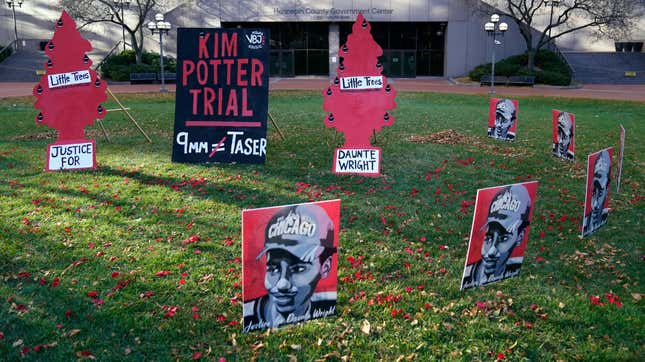
A mostly white jury has been chosen in the trial of former Minnesota Officer Kim Potter over the shooting death of Daunte Wright. Although split evenly by gender, nine jurors are white, two are Asian and only one is Black, all ranging in age from their 20s to 60s.
According to USA Today, the jurors had to answer a questionnaire before being chosen. All the jurors answered that they knew of the case because of media coverage and many said that they had already seen the body camera footage. Five jurors said they had a negative view of both Potter and Wright.
Daunte Wright was fatally shot and killed during a traffic stop in a Minneapolis suburb after Potter says she mistakenly used her gun instead of her taser on April 11. Potter resigned two days after the shooting. She was charged with first and second degree manslaughter.
According to NBC News, Minnesota’s sentencing guidelines call for minimums of over seven years for first-degree manslaughter and four years for second degree manslaughter, but prosecutors said they’re looking for heftier sentences.
The defense used all five of their peremptory challenges, which means they can dismiss a juror without reason, and the state used all of three of theirs.
From NBC:
The defense on Thursday used one of its peremptory challenges to dismiss a first-year law student who has made comments on social media about cases in which police officers have been convicted. Such challenges cannot be made solely because of a person’s race, ethnicity or gender, and prosecutor Matthew Frank objected to the dismissal of the law student, an Asian woman.
Judge Regina Chu dismissed Frank’s objection, ruling there was no evidence that the defense strike was based on race or gender.
One of the jurors seated the first day was recalled for questioning Thursday after Chu said he had expressed concerns that his identity was revealed when he was first questioned. The jury is anonymous by order of the judge. The man remained on the jury after he told Chu he was willing to continue serving.
The questionnaire taken by the jury asked several questions about the jurors thoughts and relationships to law enforcement, Blue Lives Matter, Black Lives Matter and their demonstrations, jury trials and the criminal justice system.
Four jurors said that they had negative views of Blue Lives Matter, while one juror said they didn’t care for Black Lives Matter, USA Today reports.
From USA Today:
A white man in his 40s who said he originally went to school to be a cop said Potter should have had “enough muscle memory” to prevent mistaking her gun for a Taser. He also said Wright “made a bad decision” and “tried to get back into his car.”
Four jurors own firearms, and two own or used to own a stun gun. Attorneys instructed jurors that they would need to set aside their personal knowledge or training on the weapons in court.
Jurors answered a series of questions about their trust in law enforcement and the criminal justice system. Five said they have family with military or law enforcement experience. One said he is a military veteran.
Three said police in their community make them feel safe, and two said they don’t agree with the “defund the police” movement. Two others said law enforcement officers don’t get the respect they deserve. One said he is “slightly distrustful” of cops.
Attorneys asked jurors about whether it’s right to second-guess the split-second decisions of police officers. Three jurors said they disagreed that police shouldn’t face scrutiny for decisions they make because of their dangerous jobs. Another said he “somewhat agreed” with the same statement.
Multiple jurors expressed doubts about the fairness of jury trials and the criminal justice system. “I think there’s a systemic racism problem in the system. I don’t think that necessarily affects this case,” said one juror, who was seated.
Opening statements are expected to be heard on Dec. 8. Prosecutors will have to prove both recklessness and culpable negligence for both charges to stick. Potter is planning to testify as part of her defense.
This will be the second time in history that cameras are allowed inside a Minnesota courtroom, the first being in the trial of former Minneapolis officer Derek Chauvin in the death of George Floyd.

